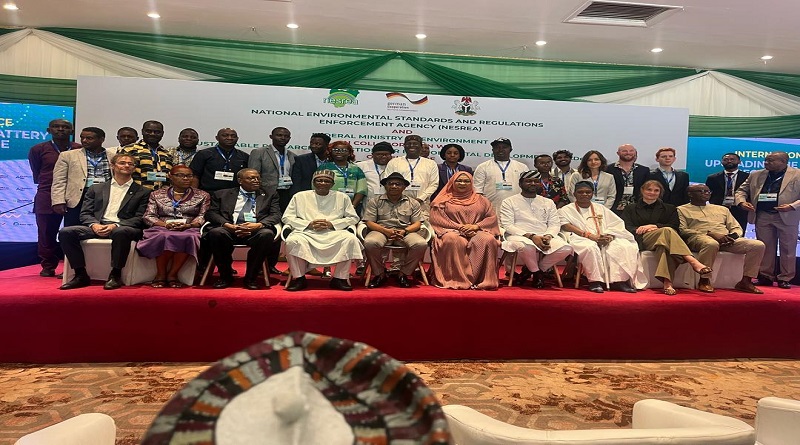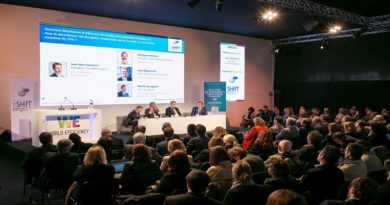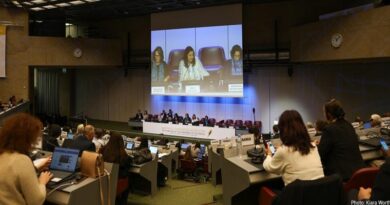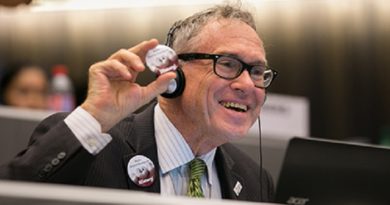NESREA, SRADeV begin two-day conference on upgrading lead-acid battery recycling sector in African region
Photo caption: Group photograph of participants at the opening ceremony of the two-day event in Abuja on Tuesday 18 March 2025.
National Environmental Standards and Regulatory Enforcement Agency (NESREA) in collaboration with Sustainable Research and Action for Environmental Development (SRADeV) on behalf of Oeko-Institut Germany on Tuesday 18 March 2025 begin a two-day international conference on “Upgrading the lead-acid battery recycling sector in the African region” at the nation’s city capital, Abuja, Nigeria.
The event, being attended by participants from Kenya, Ghana, California, Chicago, Tanzania, Cameroon, Italy, Ethiopia, Australia including traditional ruler, Commissioners of Environment, development partners, civil society groups and other stakeholders was declared opened by the Honourable Minister of Environment, Balarabe Abbas Lawal, Federal Ministry of Environment, Nigeria.
Lawal, represented at the event by the Director, Department of Pollution Control and Environmental Health of the Ministry, said the event is a major milestone in the collective efforts in addressing lead-acid battery recycling in Nigeria and Africa.
He stressed that improper disposal of lead-acid battery poses significant risk to human health and the environment.
Director-General, NESREA, Dr. Innocent Barikor, in his opening remarks, emphasized that lead-acid battery is indispensable to the telecommunication, automobile and other sectors. He, however, explained that improper disposal contaminate water and soil.
For over a year, SRADev has embarked on project titled “Partnership for Responsible Battery and Metal Recycling (ProBaMet) financed by the Initiative for Global Solidarity- a multi-stakeholder initiative promoting responsible battery recycling and responsible sourcing of secondary non-ferrous metals from Used Lead-Acid Batteries (ULABs) in Nigeria.
Lead-acid batteries are used in cars, off-grid solar energy applications or back-up power systems. Under the right conditions, used lead-acid batteries (ULABs) can be effectively recycled and the high market price of lead provides a profitable business opportunity.
However, in many world regions, recycling takes place in sub-standard, highly dangerous and unsafe conditions that release toxic lead-compounds to the workplace and surrounding environment. Lead exposure causes various severe short, mid, and long-term health impacts. According to UNICEF, up to 800 million children mostly in low and middle-income countries have elevated blood lead levels, carrying the danger of lifelong consequences.
Nigeria is host to one of the largest lead-acid battery recycling industries in Sub-Sahara Africa. At least ten facilities recycle batteries on an industrial scale mainly for exporting of recovered non-ferrous metals.
The ProBaMet project supports the upgrading of the recycling sector through three intervention levels: Providing training on environmental health and safety to recycling facilities; create incentives to facility improvements by supporting Nigerian regulatory authorities in their enforcement and create business opportunities for high-standard recycling through a coalition of solar companies looking for responsible battery disposal solutions and international companies sourcing secondary raw materials from approved facilities.
Goodwill messages were also delivered by Hon. Terseer Ugbor, Vice Chairman House on Environment; Commissioner for Environment, Ogun State, Mr. Ola Oresanya; Ologijo of Ogijo, Oba Kazeem Gbadamosi; Executive Director, Alliance for Responsible Battery Recycling (ARBR) Mrs. Miranda Amachree among others. Andreas Manhart, made presentation on ProBaMet project implementation on Nigeria-activities and main outcomes.




